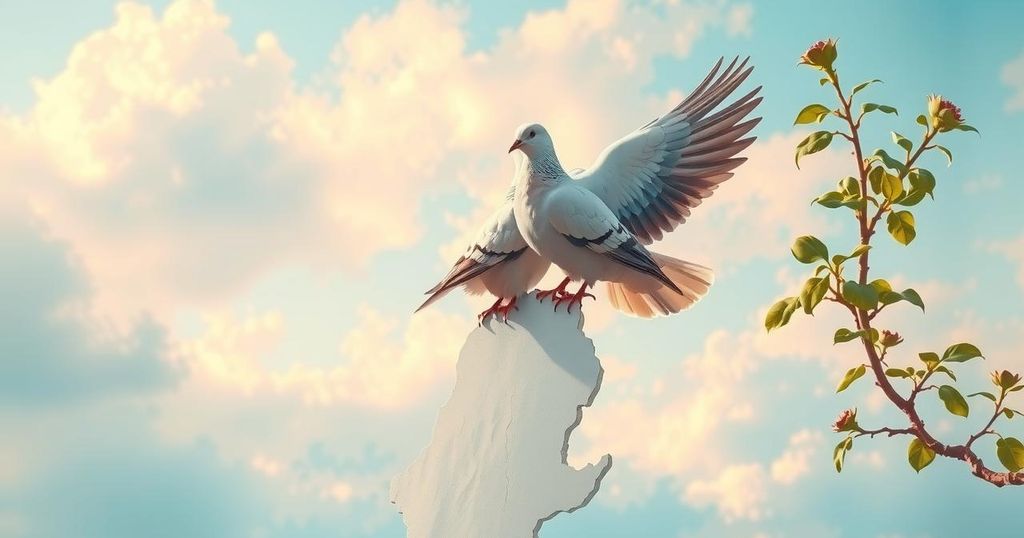Trump Announces Peace Treaty Between Congo and Rwanda, Calls It a Great Day for Africa
President Trump claims to have brokered a peace treaty between Congo and Rwanda, announcing the signing set for Monday. He expressed disappointment about not receiving a Nobel Peace Prize for his diplomatic efforts and hinted at possible direct actions against Iran in the coming weeks, emphasizing communication remains ongoing for negotiations. Meanwhile, tensions between Israel and Iran escalate amid military actions.
In a surprising announcement, President Donald Trump declared on Saturday that a peace treaty has been brokered between the Democratic Republic of the Congo and the Republic of Rwanda. This agreement, which he emphasized was a culmination of efforts aimed to end decades of violent conflict, is set to be signed in Washington on Monday. Trump expressed enthusiasm on social media, stating, “I am very happy to report that I have arranged, along with Secretary of State Marco Rubio, a wonderful Treaty between the Democratic Republic of the Congo, and the Republic of Rwanda, in their War, which was known for violent bloodshed and death, more so even than most other Wars, and has gone on for decades.”
The President touted the treaty as not only monumental for Africa but also for global peace in general. He called it, “A Great Day for Africa and, quite frankly, a Great Day for the World!” These statements have raised eyebrows, leading to skepticism from some observers about the extent to which this treaty will foster lasting peace in the region. Trump took the opportunity to critique the Nobel Peace Prize committee, lamenting, “I won’t get a Nobel Peace Prize for this… but the people know, and that’s all that matters to me!”
As this announcement unfolds, the situation in the Middle East also looms large. Trump has hinted at potential direct US action against Iran, with plans to make a decision within the next two weeks. White House Press Secretary Karoline Leavitt relayed that communication remains ongoing between the US and Iran, though specifics about these diplomatic efforts remain sparse. She confirmed that any agreement with Iran needs to ensure no uranium enrichment occurs in Tehran.
Earlier, Trump had expressed ambiguity about military action against Iran himself. When asked about a potential strike, he noted, “I may do it, I may not do it. I mean, nobody knows what I’m going to do.” He asserted that Iran is eager for negotiations but questioned why they had not sought discussions earlier. He spoke firmly about his expectations for Iran to dismantle its nuclear program or face severe consequences.
Tensions in the region boiled recently after Israel conducted strikes against Iran, which prompted retaliation from Tehran, illustrating the fragile state of affairs. Analysts have suggested that Iran’s traditional alliances, notably with Hezbollah and Syria, have been weakened, potentially reshaping the dynamics of regional power. Amidst these developments, the threats from Iran to disrupt global trade by targeting shipping lanes could have far-reaching economic impacts, particularly on oil prices. (ANI)
Millions watch these global developments unfold, keen to see how they will impact stability in Africa and the Middle East. The implications for international diplomacy arising from Trump’s peace efforts and confrontational stance toward Iran are crucial as the global community navigates these challenges.
In conclusion, President Trump’s announcement of a peace treaty between the Democratic Republic of the Congo and Rwanda marks a significant diplomatic achievement that he claims is a major step towards peace in Africa. While he remains optimistic about this development, his criticisms towards the Nobel Peace Prize indicate a frustration with the global recognition of such efforts. Meanwhile, tensions with Iran continue to escalate, with potential military action looming as the President remains unpredictable in his future decisions regarding the Middle East. The outcomes of both situations could hold substantial implications for international relations and stability.
Original Source: www.tribuneindia.com




Post Comment